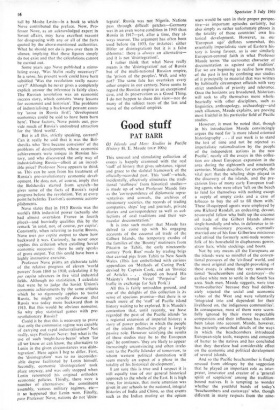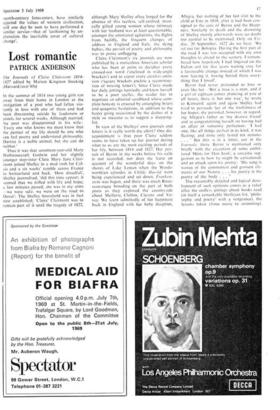Good stuff
PAT BARR
Of Islands and Men: Studies in Pacific History H. E. Maude (oue 100s)
This unusual and stimulating collection of essays is happily crammed with the real `stuff' of history that gives substance, vigour and grace to the skeletal framework of the ollicially-recorded past. This "stuff'—which, incidentally, effectively eliminates the tradi- tional 'stuffiness' from historical studies— is made up of what Professor Maude lists as the 'correspondence of diplomatic repre- sentatives and consuls, the archives of missionary societies, the records of trading companies, ships' log and journals, private diaries and correspondence as well as col- lections of oral traditions and their ver- nacular documentation.'
It is into such matter that Maude has delved to come up with his engaging accounts of the coconut oil trade of the Gilbert Islands, the temporary exodus of the families of the 'Bounty' mutineers from Pitcairn to Tahiti, the early nineteenth- century 'Pork Run' made by trading brigs that carried pigs from Tahiti to New South Wales. (This last embellished with curious appendices on 'Methods of Curing Pork' devised by Captain Cook, and an 'Invoice of Articles . . . shipped on board His Majesty's Armed Vessel "Porpoise" for traffic in exchange for Salt Pork'.) All this is fairly untrodden ground, and one of the delights of this collection is its sense of spacious promise—that there is so much more of the 'stuff' of Pacific island history waiting to be explored. It is Maude's contention that, until recently, we have regarded the past of the Pacific islands 'as a regional extension of imperial history; a story of power politics in which the people of the islands themselves play a largely passive role. However satisfying the results of these studies may be to the European ego,' he continues, 'they are likely to appear increasingly unconvincing and often irrele- vant to the Pacific Islander of tomorrow, to whom western political domination will seem merely an aspect of a phase in the totality of his historical development'.
I am sure this is true and I suspect it is still equally true of our general historical approach to the whole of the East. It is high time, for instance, that more attention was given in our schools to the national, integral histories of India and China, so that events such as the Indian mutiny or the opium wars would be seen in their proper perspec- tive—as important episodes certainly, but also simply as rather unfortunate phases in the totality of those countries' own his- torical development. However, as our
'European ego' deflates somewhat, this essentially imperialistic view of Eastern his- tory is losing favour, as is our similarly European-centred faith in what Professor Maude terms 'the sacrosanct character of documentation as against oral tradition'.
For we are beginning to realise how much of the past is lost by confining our studies of it principally to material that was written by habitually circumspect officials with very strict standards of priority and relevance. Once the horizons are broadened, historians will seek to ally themselves more whole- heartedly with other disciplines, such as linguistics, anthropology, archaeology—and such alliances, Maude explains, are proving most fruitful in his particular field of Pacific studies.
However, it must be noted that, though in his introduction Maude convincingly argues the need for 'a more island oriented historiography . . . if our work is to stand the test of time and not be rejected as imperialistic rationalisation by the people of the independent nations in the new Pacific', nearly all the essays in this collec-
tion are about European expansion in the
area during the eighteenth and nineteenth centuries. Maude describes, for example, the vital part that the whaling ships played in the discovery of the islands, and the pre- carious lives of many early European trad- ing agents who were often 'left on the beach to fend for themselves with nothing except a supply of empty casks and a case of tobacco to buy the oil to fill them with.' These ill-equipped agents were employed by one Richard Randall, an endearing, devout, resourceful fellow who built up the coconut oil trade of the Gilbert Islands almost single-handedly and who, in deference to in- creasing missionary pressure, eventually married one of his four Gilbertese mistresses and attired the formerly semi-nude women- folk of his household in diaphanous gowns. straw hats, white stockings and boots.
Not by any means all the Europeans on the islands were so mindful of the conven- tional pressures of the 'civilised' world, and the most original and thought-provoking of these essays is about the very unconven- tional 'beachcombers and castaways'—the earliest white men to settle in the South Sea area. Such men, Maude suggests, were true `trans-culturites' because they had deliber- ately rejected the social and economic values of the West and were voluntarily `integrated into and dependent for their livelihood on, the indigenous communities'. In consequence, most of them were scorn- fully ignored by their more respectable compatriots and their influence has seldom been taken into account. Maude, however, has patiently unearthed details of the ways in which the beachcombers introduced European-style tools, weapons and concepts of barter to the natives and has concluded that they therefore had considerable effect on the economic and political development of several islands.
And so the Pacific beachcomber is finally rescued from obloquy by the suggestion that he played an important role as inter- preter, innovator and creator of a 'general spirit of scepticism' among the tradition- bound natives. It is tempting to wonder whether the youthful bands of today's `beachcombers and castaways' who, though different in many respects from the nine- teenth-century lotus-eaters, have similarly rejected the values of western civilisation, will one day be seen to have performed a similar service—that of 'cushioning by ex- planation the inevitable onset of cultural change'.



































 Previous page
Previous page